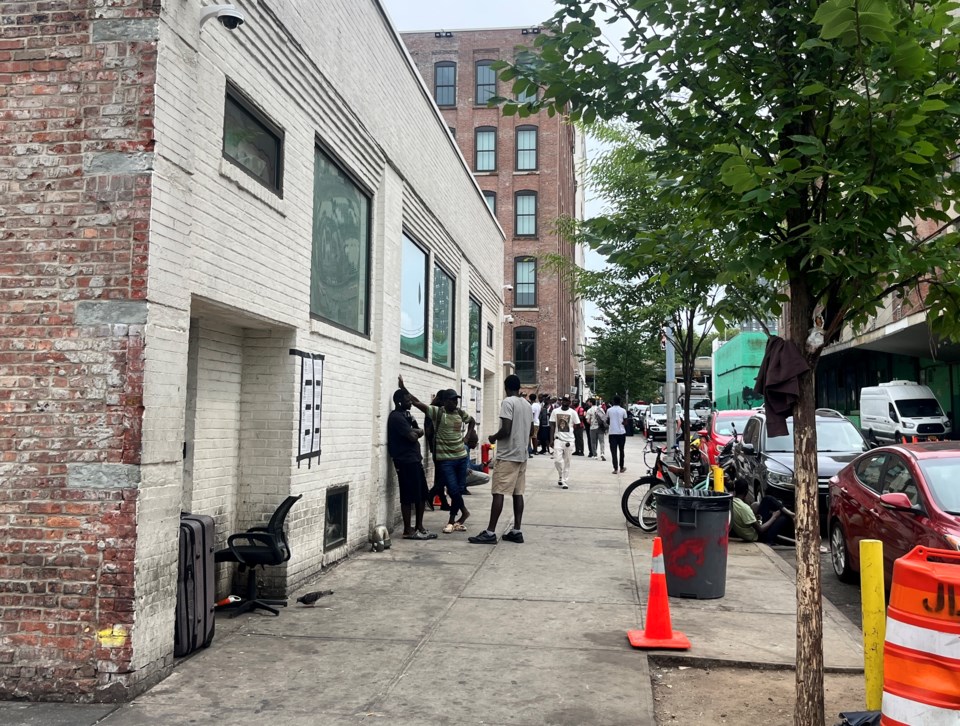Brooklyn's longtime residents weren’t alone—asylum seekers who live in the borough also felt a mix of dread and excitement after Donald Trump’s election win.
Some of the newest immigrants living in Brooklyn said the incoming administration could have a devastating impact on their families, while others were somewhat optimistic that things might not be as bleak as immigration advocates warn it could be.
The president-elect has vowed to crack down on sanctuary cities like New York City and launch a mass deportation program that could expel up to one million immigrants without citizenship per year, incoming Vice President JD Vance said in a recent interview with the New York Times Magazine. This could affect about 4.5 million people residing in New York, according to the New York Immigration Coalition.
While some fear being deported to places they fled for their lives, others are confident that the new administration will only deport bad actors and will sympathize with their genuine attempts to contribute to the country.
Nerves are running high about a changing immigration policy, but many asylum seekers who spoke to BK Reader think similarly to most Americans and said they consider economic policies the most important part of the president’s platform.
“He’ll make the economy better, there will be more work opportunities, and once we receive work papers, we will be able to get ahead,” said Diego Blanco, 30, from Colombia, who lives at the Hall Street shelter complex in Clinton Hill. “He can’t remove us all because there are people who really deserve to be here. He is intelligent enough to understand this.”
One recent immigrant said President Joe Biden's policies are not working for them and change is, in fact, needed.
“You wait six months for permission to work and even with it there isn’t any work,” said David Roja, 40, an asylum seeker from Venezuela who also lives on Hall Street.
While frustrated with the current economy, Roja said he is also frightened of Trump's deportation proposals and is planning on leaving the country in December.
Alhassane Damba, a 21-year-old asylum seeker from Guinea living in a shelter in Bushwick, came to the United States after his friend was killed in front of him at a demonstration against the junta that seized power there in 2021.
“My parents said I should come to America because America is a safe place that protects democracy,” he said. “I used to believe it, but not now. With [Trump] coming, I sincerely don’t feel safe now. I don’t know where to go.”
Another asylum seeker living on Hall Street, who asked to use the name Barry, said he was incarcerated and tortured for demonstrating for democracy with the opposition in Guinea. He said that Trump’s pledge to use the military against protesters resembles the persecution he escaped.
“We can’t go back to our country. If we get deported, it’s just like killing someone,” he said. “We want our lives to be protected, so I want him to reverse all of his statements about immigrants and let him consider immigrants [as] humans.”
New York City Mayor Eric Adams tried to allay fears of mass deportation on Nov. 7 and said he will work with the new administration and Congress "to develop a realistic and compassionate national strategy for our immigration system," which includes pushing Congress to provide expedited authorization for asylum seekers who are already here and want to work.
Manuel Castro, commissioner of Immigrant Affairs, said in Spanish that the city will be protecting immigrants' information and will not be following the instructions of the federal government in cases of mass deportations, according to the transcript provided by the mayor's office.
Castro said City Hall will have to wait and see what the Trump administration will do over the next few months.
Despite Trump’s promises, many asylum seekers in Brooklyn said they are confident that they will be exempt from deportation since they have followed all legal procedures and submitted their asylum applications.
After surviving repression in their home countries, exploitation on their journeys, and marginalization in New York, some have gained the confidence that no one can make them leave.
“In Africa, we don’t have nothing. We are here to make money and support our families,” said Moussa Sie, 48, from Mauritania, who lives at the Hall Street shelter complex. “He can’t move me back to Africa.”




